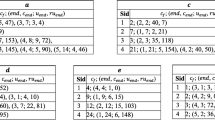Abstract
In this paper, we introduce a novel algorithm for mining sequential patterns from transaction databases. Since the FP-tree based approach is efficient in mining frequent itemsets, we adapt it to find frequent 1-sequences. For efficient frequent k-sequence mining, every frequent 1-sequence is encoded as a unique symbol and the database is transformed into one in the symbolic form. We observe that it is unnecessary to encode all the frequent 1-seqences, and make full use of the discovered frequent 1-sequences to transform the database into one with a smallest size. To discover the frequent k-sequences, we design a tree structure to store the candidates. Each customer sequence is then scanned to decide whether the candidates are frequent k-sequences. We propose a technique to avoid redundantly enumerating the identical k-subsequences from a customer sequence to speed up the process. Moreover, the tree structure is designed in a way such that the supports of the candidates can be incremented for a customer sequence by a single sequential traversal of the tree. The experiment results show that our approach outperforms the previous works in various aspects including the scalability and the execution time.
Preview
Unable to display preview. Download preview PDF.
Similar content being viewed by others
References
Agrawal, R., Srikant, R.: Fast Algorithm for Mining Association Rules. In: Proceedings of International Conference on Very Large Data Bases, pp. 487–499 (1994)
Agrawal, R., Srikant, R.: Mining Sequential Patterns. In: Proceedings of International Conference on Data Engineering, pp. 3–14 (1995)
Agrawal, R., Srikant, R.: Mining Sequential Patterns: Generalizations and Performance Improvements. In: Proceedings of the Fifth International Conference on Extending Database Technology, pp. 3–17 (1996)
Ayres, J., Gehrke, J., Yiu, T., Flannick, J.: Sequential PAttern Mining using A Bitmap Representation. In: Proceedings of ACM SIGKDD Conference, pp. 429–435 (2002)
Chiu, D.Y., Wu, Y. H., Chen, A.L.P.: An Efficient Algorithm for Mining Frequent Sequences by a New Strategy without Support Counting. In: Proceedings of International Conference on Data Engineering, pp. 375–386 (2004)
Pei, J., Han, J., Mortazavi-Asl, B., Pinto, H., Chen, Q., Dayal, U., Hsu, M.: PrefixSpan: Mining Sequential Patterns Efficiently by Prefix-Projected Pattern Growth. In: Proceedings of International Conference on Data Engineering, pp. 215–224 (2001)
Wang, K., Tang, L., Han, J., Liu, J.: Top Down FP-Growth for Association Rule Mining. In: Proceedings of Advances in Knowledge Discovery and Data Mining, pp. 334–340 (2002)
Zaki, M.J.: An efficient algorithm for mining frequent sequences. Machine Learning 42(1/2), 31–60 (2001)
Author information
Authors and Affiliations
Editor information
Editors and Affiliations
Rights and permissions
Copyright information
© 2005 Springer-Verlag Berlin Heidelberg
About this paper
Cite this paper
Cho, CW., Wu, YH., Chen, A.L.P. (2005). Effective Database Transformation and Efficient Support Computation for Mining Sequential Patterns. In: Zhou, L., Ooi, B.C., Meng, X. (eds) Database Systems for Advanced Applications. DASFAA 2005. Lecture Notes in Computer Science, vol 3453. Springer, Berlin, Heidelberg. https://doi.org/10.1007/11408079_16
Download citation
DOI: https://doi.org/10.1007/11408079_16
Publisher Name: Springer, Berlin, Heidelberg
Print ISBN: 978-3-540-25334-1
Online ISBN: 978-3-540-32005-0
eBook Packages: Computer ScienceComputer Science (R0)




